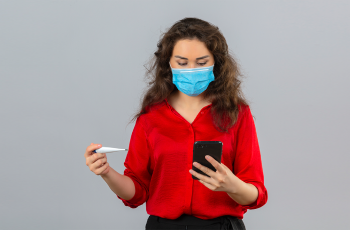What is a fever?
A fever is a short-term increase in your body’s temperature, often in response to an infection or illness. It is a signal from your body that it is defending against something harmful. When your body determines the existence of an infection or illness, it releases chemicals called pyrogens. These pyrogens signal to your brain’s thermostat, known as the hypothalamus, to elevate your body’s temperature. This rise in temperature helps your immune system operate more effectively by making it difficult for bacteria or viruses enabling the illness to survive. Usually, a fever is regarded to be a body temperature of 38°C or higher. Fever is frequently associated with other symptoms like headache, sweating, chills, and body aches.Temperature ranges for fever
The temperature ranges for fever might differ slightly depending on variables like age or individual health. However, the typical body temperature ranges that may indicate fever in adults are as follows:- Low fever: 37.3–38.0°C
- Moderate fever: 38.1–39.0°C
- High fever: 39.1–41°C
- Hyperthermia: 41°C
How to manage a fever at home?
Here are some techniques to help you manage a fever at home.- Keep yourself hydrated: To avoid dehydration from a fever, consume lots of fluids such as water, herbal teas, clear broths, and electrolyte-rich beverages.
- Medication: Paracetamol or ibuprofen are over-the-counter fever reducers that help lower temperature and ease discomfort. Follow the package's dosage instructions or seek advice from a healthcare professional, especially for children or those with pre-existing medical issues.
- Rest: Get lots of rest to help your body recover and maintain energy for battling the illness.
- Dress Lightly: Choose lightweight, breathable clothing to help release body heat.
- Avoid alcohol and caffeine: When attempting to treat a fever, caffeine, and alcoholic beverages should be avoided since they might cause dehydration.
- Cooling measures: To reduce body temperature, you may use these cooling methods:
- Place a damp, cool washcloth on your forehead, wrists, and ankles.
- Take a lukewarm bath or sponge bath.
- Use a fan to circulate air or keep the room temperature comfortable.
- Temperature control: Take regular note of your body's temperature. Seek medical assistance if the temperature worsens or stays high (usually above 103°F or 39.4°C in adults), or if you have severe symptoms like breathing problems, chest discomfort, or frequent vomiting.
- Herbal remedies: Certain plants including peppermint, elderflower, ginger, and chamomile, are thought to have fever-reducing qualities. These substances can be found in herbal teas or pills that may help reduce fever symptoms. If you have underlying medical concerns, you should speak with your doctor before utilising herbal therapies.
- Nutritious diet: Consuming a well-balanced diet full of whole grains, lean meats, fruits, and vegetables can help boost immunity and speed up the healing process after sickness. Steer clear of heavy or oily foods since they might be more difficult to digest and aggravate fever-related nausea or discomfort.
- Maintain good hygiene: Washing your hands with soap and water regularly will help stop the transmission of illnesses that can lead to fever. When you sneeze or cough, cover your mouth and nose with your elbow or a tissue to avoid the transmission of germs.
When to consult a doctor for children and adults?
For children, consult a doctor if an infant under 3 months has a rectal temperature of 38°C or higher, or if a child between 3 months and 3 years has a temperature of 38.9°C or higher. Seek medical treatment for children over three years old if fever lasts more than 72 hours, worsens, or if symptoms such as dehydration, trouble breathing, severe headache, or rash appear. Adults should consult a doctor if they have a fever above 38°C especially if it is persistent for more than three days. If you happen to experience severe symptoms like trouble breathing, chest discomfort, disorientation, a severe headache with neck stiffness, a rash that doesn’t blanch, or continuous vomiting, it is advisable to consult a doctor immediately.Can a telehealth appointment with an online doctor help with fever?
Yes, fever may be managed via an online consultation with a telehealth doctor. To determine the root cause of your fever, the doctor can check your symptoms, and medical history, and inquire about recent exposure to infections via video or phone consultation. They can help in managing a fever at home, including recommendations for over-the-counter medications, hydration, rest, and when to seek further medical care. Particularly in situations when in-person visits may not be possible, telehealth sessions provide a practical and accessible means to obtain medical advice and assistance. However, you should seek immediate medical advice in person if your symptoms are severe or if you have worries about a potentially dangerous underlying disease. So, managing a fever requires a holistic approach that prioritises adequate rest, hydration, appropriate medication use, and external cooling methods. By following these principles and seeking medical advice when needed, individuals can tackle fever proficiently, supporting the body’s natural healing processes and cultivating ease and wellness.
Consult an Online Doctor in 15 mins










 Facebook
Facebook Instagram
Instagram LinkedIn
LinkedIn



